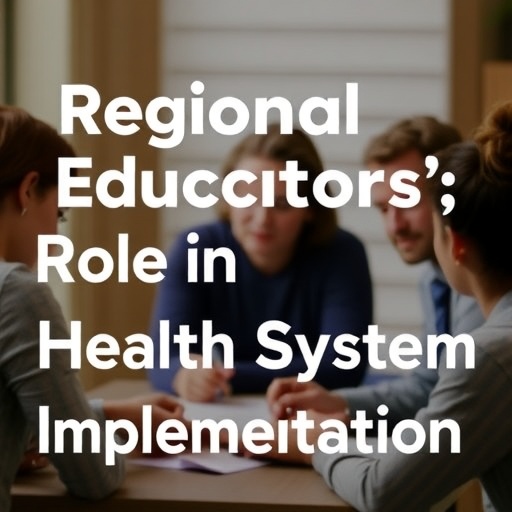In recent years, the importance of mental health in educational settings has become overwhelmingly clear. As schools grapple with the numerous challenges posed by students’ mental health needs, they increasingly turn to Regional Educational Agencies (REAs) for support in implementing Comprehensive School Mental Health Systems (CSMHS). A new study sheds light on the invaluable experiences of the staff at these agencies, who play a crucial role in fostering supportive environments for students across the educational landscape.
The study, authored by Meek Farley, E. Gleason, and J. Walther, investigates the pivotal experiences and perceptions of REA staff members engaged in the implementation of CSMHS. By delving into the day-to-day interactions, challenges, and successes that these professionals encounter, the researchers aim to illuminate the best practices and potential hurdles that may arise in the continuous pursuit of mental health supports within schools.
Central to the discussion is the rising incidence of mental health challenges among students. Depression, anxiety, and behavioral issues have surged in recent years, necessitating a robust response from the educational community. REAs act as facilitators, connecting schools with necessary resources and training to instill effective mental health support systems. This study highlights how essential their contributions are to creating resilient educational environments that prioritize student wellbeing.
One critical finding of the research is the importance of tailored training for REA staff. Understanding that each school district has unique needs and challenges, the researchers emphasize the necessity of equipping agency staff with tailored resources and training sessions. This enables them to meet the specific demographics and cultural contexts of the schools they serve, ultimately leading to more effective mental health interventions.
Moreover, the study illustrates the collaborative nature of implementing mental health programs. REA staff often work in tandem with educators, school counselors, and mental health professionals to build comprehensive systems that address students’ needs holistically. This collaborative approach ensures that mental health services are seamlessly integrated into everyday school operations, breaking down barriers that might otherwise hinder students’ access to essential support.
Another intriguing aspect of the study is the emphasis on the emotional labor associated with these roles. The staff members at REAs often bear the emotional weight of their responsibilities, navigating complex challenges while supporting educators and students alike. The study draws attention to the need for adequate self-care and mental health resources for these professionals, as their well-being is crucial to sustaining high-quality support services.
One of the researchers’ key recommendations is the establishment of mentorship programs between experienced REA staff and newcomers. This peer-to-peer learning model not only fosters knowledge sharing but also strengthens professional relationships and networks. New staff gain insights from seasoned professionals who have successfully navigated the complexities of implementing mental health programs, ultimately resulting in more effective and confident service providers.
Furthermore, the study highlights the significance of ongoing evaluation and feedback within the framework of CSMHS. REA staff are encouraged to evaluate the effectiveness of the strategies they implement, gathering insights and data to inform future practices. This iterative process ensures that programs remain relevant, responsive, and rooted in concrete evidence that resonates with the varied experiences of students in different contexts.
In addition, the research underscores the importance of advocating for systemic change. REA staff must often navigate bureaucratic obstacles and policy constraints that can hinder the implementation of effective mental health services. By sharing their experiences, the authors advocate for a more integrated approach to mental health policy within educational systems, promoting the understanding that student well-being is intrinsically linked to academic success.
The study stresses that the implementation of Comprehensive School Mental Health Systems is not merely an administrative duty but a moral imperative. As educational communities recognize the holistic needs of their students, the role of REAs evolves into one of advocacy, capacity building, and strategic implementation. Shifting the discourse around mental health from stigmatization to proactive support is paramount in nurturing an environment conducive to learning.
Additionally, the authors encourage a broader engagement with families and communities in the realm of school mental health. Understanding the familial and community contexts surrounding students can provide essential insights that enhance the effectiveness of mental health interventions. By bridging the gap between home, school, and community, REA staff can adopt a more comprehensive approach that astutely addresses mental health challenges.
As we move forward, it is critical that the insights gleaned from this research inform the training and support provided to Regional Educational Agencies. The complexities of mental health necessitate that educational staff be equipped with both knowledge and resilience. By embracing a sustainable framework for mental health support, educational agencies can ongoingly contribute to the emotional and psychological well-being of students, thereby fostering an enriched learning environment.
In conclusion, the study by Farley and colleagues serves as a clarion call to prioritize mental health in educational settings. The voices of REA staff, illuminated through their experiences, create a compelling narrative that advocates for systemic integration of mental health services. As the landscape of education shifts to accommodate the diverse needs of students, cultivating supportive mechanisms becomes essential for fostering an environment where every student can thrive.
Subject of Research: Experiences of Regional Educational Agency Staff in Implementing Comprehensive School Mental Health Systems
Article Title: The Experiences of Regional Educational Agency Staff Supporting the Implementation of Comprehensive School Mental Health Systems
Article References:
Meek Farley, J., Gleason, E., Walther, J. et al. The Experiences of Regional Educational Agency Staff Supporting the Implementation of Comprehensive School Mental Health Systems.
School Mental Health (2025). https://doi.org/10.1007/s12310-025-09831-5
Image Credits: AI Generated
DOI: https://doi.org/10.1007/s12310-025-09831-5
Keywords: Mental health, school systems, Regional Educational Agencies, comprehensive mental health, educational support, systemic change




